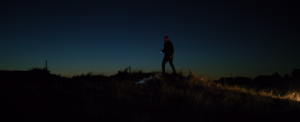Written and directed by siblings Kevin and Matthew McManus, the filmmakers behind coming-of-age comedy Funeral Kings (2012) and the executive producers of Netflix’s American Vandal (2017–2018), The Block Island Sound is a slow-burning mystery with elements of horror and science fiction, but a family drama lies at its centre. Our Culture reviews the film here for its selection as part of the 2020 Fantasia International Film Festival.
Strange things are happening on Block Island, RI. Fish are washing up on its beaches by the ton, birds are mysteriously falling out of the sky, and Harry Lynch (Chris Sheffield) is convinced something is wrong with his father, Tom (Neville Archambault). A fisherman, Tom has been experiencing blackouts and exhibiting erratic behaviour – and seems strangely drawn to the ocean, routinely taking his boat out on the water late at night and not returning until morning. After Harry’s sister Audrey (Michaela McManus) and her young daughter Emily (Matilda Lawler) arrive at the family home, Harry himself becomes entangled with the same mysterious force that ensnared his father as it exerts its weird influence over him from somewhere off the island shore.
For at least its first hour, The Block Island Sound feels like the missing film from a triple-bill with Sea Fever (2019) and The Beach House (2020), a nautical nightmare filled with images of beached fish and the frightening vastness of open water. It even appears to have many of the same thematic concerns as those two films, as something out at sea starts to insidiously seep into the minds and bodies of those on land. All three films, then, would seem to be using the ocean to create horror inflected with the climate crisis, but Block Island‘s narrative does not necessarily go in the direction we might expect.
Instead, the film concentrates on family drama as Harry falls further and further into the thrall of some unknowable thing and those around him – chiefly Audrey – try to pull him back. Block Island is thus a film ultimately concerned with much more intimate issues and particularly familial relations, as it uses horror and science fiction elements to touch on the ravages of grief, alcoholism and mental illness – and the unfortunate tendency of parents to pass their traumas to their children. The interplay between parents and siblings here is both gripping and affecting, but feels a tad familiar.
After all, the same science fiction tropes used by The Block Island Sound in its last half-hour have been combined with familial drama many times before, and there is a sense that the film has narrowly missed a chance to do something innovative and relevant – even urgent – in leaving those ecological themes ill-defined. While it does briefly hint at the unfortunate tendency of man to mess with nature in its final minutes, there is an inescapable feeling that its larger thematic concerns have been left unexplored.

But even if the loftier commentary that seems to be building in the film’s first two acts gets a little lost in its third, there’s a great deal to admire about Block Island. It boasts excellent sound design by Andrey Radovski, as radios and other electrical equipment become devices through which some monster communicates (giving the Block Island Sound a clever double meaning), and Paul Koch’s atmospheric score is filled with a mounting sense of dread that doesn’t let up until the climax. The cinematography by Alan Gwizdowski adds to that sense of foreboding through long, lingering shots of the Block Island coastline, the desolate stillness of the ocean and the many dead things that wash up on the shore.
The performances are convincing across the board, with Sheffield and Archambault turning in particularly admirable turns as deeply troubled men, Harry’s dysfunctional behaviour clearly shaped by and feeding off his father’s throughout the narrative. Jim Cummings – best known as the writer, director and star of Thunder Road (2018) – gives a particularly scene-stealing performance as Harry’s friend Dale, a card-carrying conspiracy theorist who subscribes to every tinfoil-hat theory going (except, he is quick to point out, lizard people).
The Block Island Sound is, then, an intriguing slow-burn mystery with an affecting family drama at its heart, but one that might have done something a little fresher in its final act – when the exact nature of the thing lurking at its peripheries is finally revealed.

